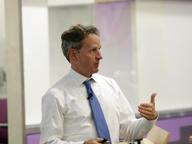Faculty News
—
Professor Paul Romer's research on technological change is cited
—

Excerpt from National Post -- "In his seminal 1990 article 'Endogenous Technical Change,' Paul Romer identified a couple of crucial features about new ideas. Firstly, they are what economists call non-rival goods: more than one person can share a new idea without affecting its usefulness to other people. In the absence of at least some IP protection, it would be almost impossible for firms or researchers to cover the costs of R&D. IP devices such as patents give their holders a temporary monopoly in the use of a certain technology, and those monopoly profits can be used to cover the costs of R&D."
Faculty News
—

Excerpt from National Post -- "In his seminal 1990 article 'Endogenous Technical Change,' Paul Romer identified a couple of crucial features about new ideas. Firstly, they are what economists call non-rival goods: more than one person can share a new idea without affecting its usefulness to other people. In the absence of at least some IP protection, it would be almost impossible for firms or researchers to cover the costs of R&D. IP devices such as patents give their holders a temporary monopoly in the use of a certain technology, and those monopoly profits can be used to cover the costs of R&D."






















